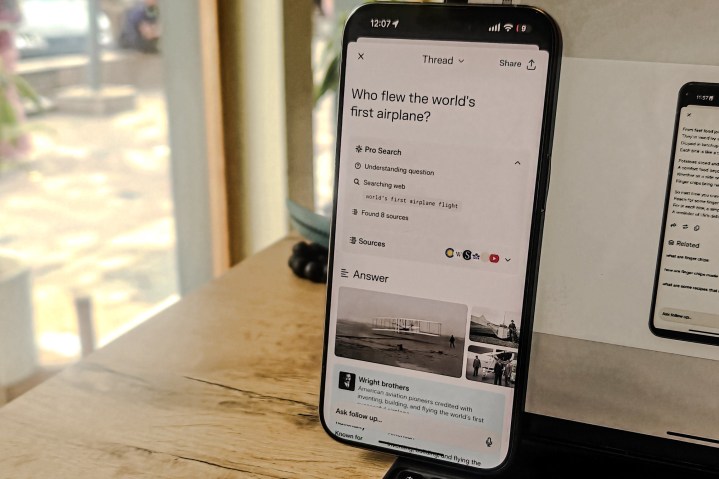
The latest trend in the hot artificial intelligence brawl is multi-modal AI — one that can talk, see, and listen. It spawned a whole class of AI gadgets, such as the Rabbit R1 and the Humane AI Pin, to capitalize on all the futuristic hype.
Within a span of two days in May, OpenAI demoed a world-sensing talkative avatar of ChatGPT, and Google did something similar with Project Astra for its Gemini Assistant. The objective is clear: AI won’t be limited to texts and stills, neither at the human input point nor the machine output terminal.
London-based upstart Nothing apparently got a prescient whiff of the changing landscape. In April, the company announced a pair of new wireless earbuds in the Nothing Ear series. They sound great, look neat, and won’t annihilate wallets, but their biggest bet is on the future — thanks to a pinch gesture that will have ChatGPT whispering in your ears.
Sliding into ChatGPT’s DMs

The clever ChatGPT integration is driven by the Nothing X app. Starting with the Nothing Phone 2a, the feature is now available on older phones and every other earbud Nothing has ever made. I love it when brands expand functional goodness to older and more affordable hardware, and that’s exactly what Nothing did.
The intention is good, and the execution on Nothing’s part is flawless. There is no jarring manual setup involved. You just need the latest software update installed on your phone and earbuds firmware via the app, and you’re good to go.
Simply pair the earbuds to your Nothing Phone, and the Nothing X app will tell you that a pinch and long press gesture on the left earbuds will pull up ChatGPT voice mode. You don’t have to launch the ChatGPT app or any app whatsoever. Just pinch the stem, and you can start a human-machine conversation, even when your phone’s screen is off.

Now, just how rewarding this ChatGPT-earbud bonhomie is depends squarely on how badly you need the ChatGPT smarts in your day-to-day life. Do you need ChatGPT desperately enough to spend $20 for a premium each month?
I ask because you will soon run into that wall. You see, ChatGPT is still, well, ChatGPT. Let me describe the limitation in ChatGPT’s own words: “As of my last update in January 2022…” Or “I can’t provide real-time updates or information beyond January 2022.” The free version of ChatGPT cannot search for up-to-date information. Instead, its knowledge is limited to things that happened from January 2022 and earlier.
A (mostly) magical AI experience

Now, that may not be a problem for everyone. ChatGPT is still a terrific knowledge bank, and a great summarizer of it all. It’s just that if you don’t pay your subscription tax to OpenAI, it will serve a chatty philosopher that has been on a sabbatical since January 2022. If you want it to access current information, you need to subscribe to ChatGPT Plus.
On my way to a workspace, I pinched the Nothing earbuds’ stem and asked it to explain convolutional neural networks (CNN) from the perspective of self-driving cars. It did a great job at it. I just wish it taught me lessons on cutting-edge automobile AI in the voice of Scarlett Johannson, but alas.
“It just comes naturally to us, even if we’re conversing with computers.”
But personal AI voice kinks aside, it was a great prep for me. By the time I set my iPad Pro on a desk alongside a hellishly strong cup of espresso, I was ready to furiously type a few hundred words on the tech and how computer scientist Yann LeCun absolutely schooled Elon Musk on the role of CNNs on X.

It’s plain wonderful that the entire world’s knowledge (assuming human civilization ended in January 2022) is ready to be recited in your ears via a pair of Nothing earbuds. I uttered my current location in the earbuds’ onboard mics, and ChatGPT picked up three nearby pizzerias for me.
Having all that information spoken in your ears, without ever having to touch your phone, is a convenience that needs to be experienced firsthand. It also helped me with a brief recap of the must-visit places in the cold desert of Ladakh and a rundown of the highly-rated hostels in Colombo.
Pricey frustrations

But the AI honeymoon ends as soon as you try to live in the moment. Ask it questions like, “Who won the recent WWE King of Ring tournament,” “How is the weather across the city,” or “When’s the next Arsenal match in the Premier League,” and you will be served a frustrating non-answer.
This is all because of that notorious knowledge cutoff sitting at the dawn of 2022. Now, you can make ChatGPT surf the web and find the latest information popping up on the internet. But that trick, which piggybacks on Microsoft’s Bing search engine, is not free.
You need to pay at least $20 each month for a ChatGPT Plus subscription in order to launch ChatGPT’s Browse with Bing superpower. If only there were another AI that would summarize the web for you, free of cost and with real-time information.
Lucky for you, there is one, and it’s called Perplexity. Digital Trends section editor Joe Maring is a fan, and so am I. But the moment you tap the audio icon to hear the web-summarized answer in your Nothing earbuds, it throws a subscription page in your face starting at $20 per month.
Nothing’s intentions of making AI access more convenient are admirable, and I’m all for tech that focuses on this aspect. However, experts are not too keen on putting generative AI in the ear canals. They are not bowled over by it, but digital communication veterans see it as an inevitable shift.
Experts are optimistic

Among the optimists are Justin Uberti, creator of Google Duo and WebRTC standard, former engineering lead for Google’s Stadia’s gaming app, and head of streaming technology of pandemic-era hit Clubhouse. In a nutshell, he knows his stuff about digital communications.
“I would say that over the next couple of years, voice interaction will become our main method of communicating with AI, simply because it’s more convenient and offers a richer, more comfortable experience,” Uberti tells Digital Trends.
Uberti also mentions self-healing, linking it with an AI’s usual fumbles and the way humans struggle during natural conversations. “Spoken language also carries a certain authority that written words do not. For better or for worse, people are often more trusting of information they hear when it’s said aloud and with conviction,” he adds.

That’s where the well-reported issues of hallucination come into the picture. The well-documented mistakes of AI Overviews on Google Search prove that even an AI pioneer like Google still has a long way to go in establishing trust for AI as a reliable companion.
But as convenient as it sounds to chat with an AI without even touching a phone, you need to fact-check, and for that, your phone eventually has to come out. The same applies to dedicated AI hardware, as well, which now seems as good as overhyped vaporware.
Uberti also touched on the topic of being distracted, as ChatGPT over-enthusiastically spills a stream of knowledge in our ears. “Speaking with an AI still keeps our hands and eyes free, so in that respect, it’s much safer than anything we might do via text while out in public,” Uberti says.
“We learn how to do it long before we learn how to type.”
But he’s acutely aware of the inherent risks, which is why his company, Fixie.ai, is focused on building “enjoyable, low-stakes applications for voice-based AI,” where conversations lean more toward fun than hardcore productivity.
John Licato, assistant professor (Computer Science and Engineering) at the University of South Florida, thinks Nothing’s move to put ChatGPT in our ears is a step in the right direction, but voiced concerns about these error-prone products hallucinating.

“Not only will this help people who have visual impairments, but it will also help those who don’t because we’ll be able to interact with systems while driving or while our hands are busy,” he adds.
Currently associated with the university’s Advancing Machine and Human Reasoning (AMHR) Lab, Licato says he’s focused on “a net benefit,” adding that voice conversations with an AI will certainly be less distracting than any other option available at the moment.
Brian Prince, founder of an educational AI resource hub, also highlights the accessibility aspect and how it acts as a democratizing agent. “Voice control adds another layer of accessibility as well for users who are blind, can’t type for whatever reason, or struggle with reading and comprehension,” Prince tells Digital Trends.
The caveats amid the hype fog

Innovations, like the one Nothing is hawking, could also make an impact in the telemedicine segment. “In health care for underserved populations where English is not their first language, voice in generative AI is a game-changer,” Ramini Bastani, CEO and founder of digital health company Healthvana, tells Digital Trends.
But every product needs to solve a tangible real-world problem, and not just for a handful of people. For some, ChatGPT might be a savior, but the same can’t be said about the masses.
“I did not see any real-world business problems being solved, and some of them can already be done today with existing technology in a better way,” says Max Vermeir, senior director of AI strategy at ABBYY, a firm that offers AI-driven solutions for enterprises.
The standout risk seems to be safety, especially given the non-consensual and liberal approach AI labs have taken to amassing data for training and fine-tuning.
“This concern is exacerbated by the fact that users may not be aware that their conversations are being recorded and transmitted to the chatbot’s servers for processing and analysis,” says Yi Fang, associate professor of Computer Science and Engineering at Santa Clara University.
In my interactions with experts, it seems generative AI tools like ChatGPT have a more positive impact, but the true potential is yet to be explored. AI needs to fix its inherent problems, and the costs of something as basic as web browsing and voice interactions should obviously come down.
For its part, Nothing gave its best.
Editors’ Recommendations
Services Marketplace – Listings, Bookings & Reviews
